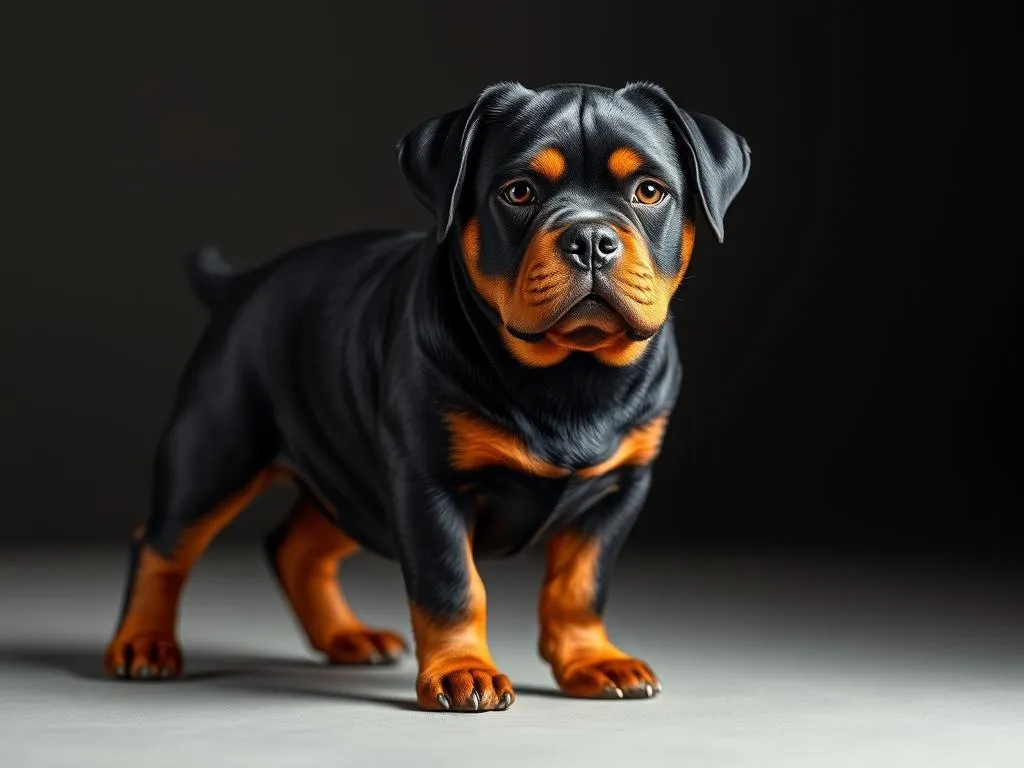
Introduction
Dog breeds play a significant role in our lives, offering companionship, protection, and joy. Each breed has its unique characteristics, history, and care requirements, making them special in their own right. Among these breeds, the Miniature Rottweiler stands out as a smaller version of the beloved Rottweiler, combining strength and affection in a compact size.
The Miniature Rottweiler is not a recognized breed by major kennel clubs, but it has gained popularity among dog lovers for its friendly demeanor and loyalty. This article delves into the world of Miniature Rottweilers, exploring their characteristics, care needs, training, and much more.
Understanding the Miniature Rottweiler
Definition and Characteristics
The Miniature Rottweiler is essentially a smaller variant of the standard Rottweiler. While they maintain many of the same traits, including loyalty and intelligence, they do so in a more diminutive package.
Key physical traits of the Miniature Rottweiler include:
– Size: Typically weighing between 35 to 70 pounds and standing about 10 to 15 inches tall.
– Coat Type: They possess a short, dense coat that is weather-resistant, similar to their larger counterparts.
– Color Variations: Standard colors are black and tan, although some may exhibit variations such as brindle or blue.
In terms of temperament, the Miniature Rottweiler is known for being:
– Personality: Affectionate, loyal, and protective.
– Behavior: Playful yet calm, making them excellent companions.
– Energy Levels: Moderately active, requiring regular exercise but also enjoying downtime with their families.
History of the Miniature Rottweiler
The origin of the Rottweiler breed can be traced back to ancient Rome, where they were used to drive cattle and pull carts. The breed has been known for its strength and protective nature. However, the development of the Miniature Rottweiler emerged from selective breeding practices aimed at creating a smaller version that could better fit into urban lifestyles.
Breeders focused on reducing the size while preserving the essential traits of the Rottweiler, leading to the emergence of the Miniature Rottweiler. This trend was partly driven by the demand for smaller dogs that still exude the confidence and loyalty of their larger counterparts.
Differences Between Miniature and Standard Rottweilers
Size Comparison
One of the most apparent differences between Miniature and Standard Rottweilers is their size.
- Height and Weight Differences: Standard Rottweilers typically stand between 22 to 27 inches tall and weigh between 80 to 135 pounds, while Miniature Rottweilers are considerably smaller, standing 10 to 15 inches tall and weighing 35 to 70 pounds.
- Visual Differences: While they share similar facial features and body structure, the smaller size of the Miniature Rottweiler gives them a different silhouette, making them look more compact.
Temperament and Behavior
Both breeds are known for their loyalty and protective instincts, but there are some differences in their behavior.
- Personality: The Miniature Rottweiler tends to exhibit a slightly more playful demeanor due to their smaller size, making them more adaptable to family settings.
- Training Needs: Training for both breeds is essential, but the Miniature Rottweiler may require a gentler approach due to their smaller stature, especially when it comes to socialization.
Health Considerations
Health is a crucial aspect to consider when choosing between the two breeds.
- Common Health Issues: Miniature Rottweilers may be prone to certain health issues such as hip dysplasia, heart problems, and obesity, similar to their larger counterparts but with some variations in prevalence.
- Lifespan Expectations: On average, Miniature Rottweilers tend to live longer than Standard Rottweilers, often reaching 12 to 15 years, while Standard Rottweilers typically live around 8 to 10 years.
Care Requirements for Miniature Rottweilers
Diet and Nutrition
Providing a balanced diet is crucial for the health of your Miniature Rottweiler.
- Recommended Diet: A high-quality dog food formulated for small to medium breeds is ideal. Look for options that list meat as the first ingredient and contain balanced nutrients.
- Nutritional Needs: Depending on their activity level, Miniature Rottweilers may require between 1 to 1.5 cups of food daily, divided into two meals to prevent overeating.
Exercise Needs
Physical activity is essential for maintaining the health and happiness of your Miniature Rottweiler.
- Importance of Physical Activity: Regular exercise helps manage their energy levels, keeping them fit and reducing behavioral issues.
- Suggested Exercise Routines: Daily walks, playtime in a secure yard, and engaging games such as fetch or agility training are great ways to keep your Miniature Rottweiler active.
Grooming
Grooming is relatively straightforward for the Miniature Rottweiler.
- Frequency of Brushing: Their short coat requires minimal brushing, about once a week, to remove loose hair and minimize shedding.
- Bathing and Nail Trimming: Bathing should be done as needed, typically every couple of months. Regular nail trimming and dental care are also essential for overall health.
Training and Socialization
Training Basics
Starting training early is crucial for your Miniature Rottweiler.
- Importance of Early Training: Early socialization and training help prevent behavioral issues and ensure they grow into well-mannered adults.
- Recommended Training Methods: Positive reinforcement is highly effective with this breed. Use treats, praise, and play as rewards for good behavior.
Socialization Techniques
Socializing your Miniature Rottweiler is vital for their development.
- Importance of Socializing: Introducing them to various environments, people, and other animals can help them become well-adjusted adults.
- Tips for Effective Socialization: Gradual exposure to new experiences, attending puppy classes, and facilitating playdates with other dogs can enhance their social skills.
Health and Wellness
Common Health Issues
Being aware of potential health problems can help you provide the best care for your Miniature Rottweiler.
- Overview of Prevalent Health Concerns: Common health issues include joint problems, heart conditions, and obesity. Regular check-ups with a veterinarian can help catch these issues early.
- Preventive Measures: Keeping your Miniature Rottweiler at a healthy weight through proper diet and exercise is essential.
Veterinary Care
Regular veterinary visits are critical for maintaining your dog’s health.
- Importance of Regular Veterinary Visits: Routine check-ups can help detect health problems before they become serious.
- Vaccination Schedules: Ensure your Miniature Rottweiler is up-to-date on vaccinations and receives regular health screenings as recommended by your veterinarian.
Finding a Miniature Rottweiler
Responsible Breeding Practices
When looking for a Miniature Rottweiler, it’s essential to find a responsible breeder.
- How to Identify Reputable Breeders: Look for breeders who prioritize health testing of their breeding dogs and provide a clean, safe environment for their puppies.
- Questions to Ask Potential Breeders: Inquire about health clearances, breeding practices, and the socialization of the puppies.
Adoption Options
Adopting a Miniature Rottweiler can be a rewarding experience.
- Overview of Adopting from Shelters or Rescues: Many shelters and rescues have dogs looking for loving homes, including Miniature Rottweilers.
- Benefits of Adoption: Adopting not only gives a dog a second chance but also helps reduce the number of dogs in shelters.
Living with a Miniature Rottweiler
Family Considerations
The Miniature Rottweiler can be an excellent addition to families.
- Suitability for Families with Children: Their friendly nature and protective instincts make them great companions for kids.
- Interaction with Other Pets: Proper introductions and socialization can help them coexist peacefully with other household pets.
Lifestyle Compatibility
Before bringing a Miniature Rottweiler into your home, assess your lifestyle.
- Urban vs. Rural Living: These dogs can adapt well to different living environments, but they thrive in homes where they receive ample exercise and attention.
- Managing Needs in Different Environments: Ensure you have the time and space to provide for their exercise and social needs, whether in an apartment or a house with a yard.
Conclusion
In summary, the Miniature Rottweiler is a charming and affectionate breed that offers all the strengths of the Rottweiler in a smaller package. With proper care, training, and socialization, they can be a wonderful addition to any family. For those considering a dog, the Miniature Rottweiler presents an opportunity to enjoy the companionship of a loyal and loving pet.
Owning a Miniature Rottweiler comes with responsibilities, but the joys they bring are immeasurable. For potential dog owners, this breed is certainly worth considering as a faithful companion.









